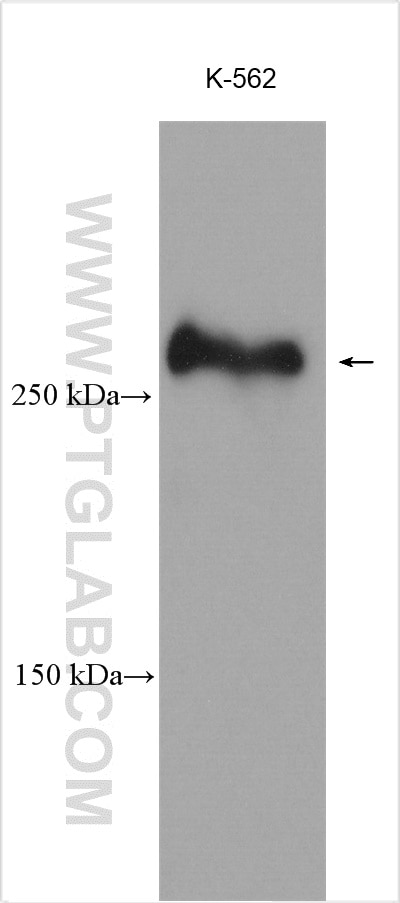Anticorps Polyclonal de lapin anti-KMT2C
KMT2C Polyclonal Antibody for WB, ELISA
Hôte / Isotype
Lapin / IgG
Réactivité testée
Humain
Applications
WB, IF, CoIP, ChIP, ELISA
Conjugaison
Non conjugué
N° de cat : 28437-1-AP
Synonymes
Galerie de données de validation
Applications testées
| Résultats positifs en WB | cellules K-562, |
Dilution recommandée
| Application | Dilution |
|---|---|
| Western Blot (WB) | WB : 1:500-1:1000 |
| It is recommended that this reagent should be titrated in each testing system to obtain optimal results. | |
| Sample-dependent, check data in validation data gallery | |
Applications publiées
| WB | See 2 publications below |
| IF | See 1 publications below |
| CoIP | See 1 publications below |
| ChIP | See 1 publications below |
Informations sur le produit
28437-1-AP cible KMT2C dans les applications de WB, IF, CoIP, ChIP, ELISA et montre une réactivité avec des échantillons Humain
| Réactivité | Humain |
| Réactivité citée | Humain |
| Hôte / Isotype | Lapin / IgG |
| Clonalité | Polyclonal |
| Type | Anticorps |
| Immunogène | KMT2C Protéine recombinante Ag28875 |
| Nom complet | myeloid/lymphoid or mixed-lineage leukemia 3 |
| Masse moléculaire calculée | 541 kDa |
| Poids moléculaire observé | 541kDa, 269 kDa |
| Numéro d’acquisition GenBank | NM_170606 |
| Symbole du gène | MLL3 |
| Identification du gène (NCBI) | 58508 |
| Conjugaison | Non conjugué |
| Forme | Liquide |
| Méthode de purification | Purification par affinité contre l'antigène |
| Tampon de stockage | PBS avec azoture de sodium à 0,02 % et glycérol à 50 % pH 7,3 |
| Conditions de stockage | Stocker à -20°C. Stable pendant un an après l'expédition. L'aliquotage n'est pas nécessaire pour le stockage à -20oC Les 20ul contiennent 0,1% de BSA. |
Informations générales
Lysine (K)-specific methyltransferase 2C (KMT2C, also known as MLL3) belongs to the mixed-lineage leukemia (MLL) family of histone methyltransferases which methylate the histone 3 tail at lysine 4 (H3K4) as part of the complex proteins associated with Set 1 (COMPASS) complex. Although originally identified as oncogenic fusions in leukemia, genome-wide mutation studies have revealed frequent, presumably loss-of-function, mutations in various members of the MLL family, including MLL2/KMT2B, MLL3/KMT2C, and MLL4/KMT2D in a variety of malignancies, particularly solid tumors. Mechanistic studies of KMT2C in normal cells have focused primarily on its role in enhancer regulation by deposition of H3K4me1 marks.
Protocole
| Product Specific Protocols | |
|---|---|
| WB protocol for KMT2C antibody 28437-1-AP | Download protocol |
| Standard Protocols | |
|---|---|
| Click here to view our Standard Protocols |
Publications
| Species | Application | Title |
|---|---|---|
Int Immunopharmacol Polysaccharides from Platycodonis Radix ameliorated respiratory syncytial virus-induced epithelial cell apoptosis and inflammation through activation of miR-181a-mediated Hippo and SIRT1 pathways. | ||
J Biol Chem TRIM28 represses renal cell carcinoma cell proliferation by inhibiting TFE3/KDM6A-regulated autophagy | ||
Adv Sci (Weinh) TAOK3 Facilitates Esophageal Squamous Cell Carcinoma Progression and Cisplatin Resistance Through Augmenting Autophagy Mediated by IRGM |


